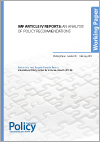
IMF Article IV Reports: An Analysis of Policy Recommendations
Abstract:When the International Monetary Fund (IMF) was created during the United Nations Monetary and Financial Conference in 1944, its purpose was “to provide a framework that facilitates the exchange of goods, services, and capital among countries, and that sustains sound economic growth.” In that context of the Bretton Woods system, the Fund’s main responsibility was to support the operation of the new system of fixed exchange rate regimes. With the breakdown of the par-value system in 1971, the Article on exchange rate arrangements, Article IV, had to be revised to legalise the choice for a floating exchange rate regime. In accordance with the new principle of guaranteeing a stable system of exchange rates, the Article stated that member countries should seek a stable exchange rate arrangement and mentioned policies they should pursue to achieve these goals. The Article makes reference not only to external aspects, such as exchange rate manipulation, but also to the domestic side— “orderly economic growth with reasonable price stability” and “orderly underlying economic and financial conditions”. (…)
This publication can also be founded in a condensed and/or expanded format: